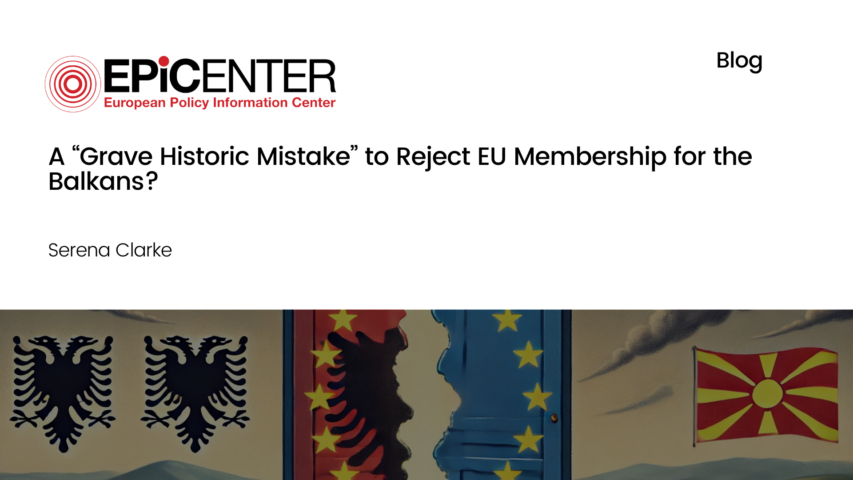A “Grave Historic Mistake” to Reject EU Membership for the Balkans?

A “Grave Historic Mistake” to Reject EU Membership for the Balkans?
Serena Clarke // 6 November 2019
Albania and North Macedonia have been left disappointed after French President Emmanuel Macron blocked membership talks for the two Balkan States. However, all hope is not lost. Earlier this week, European Parliament President David Sassoli made his first official visit outside the EU to North Macedonia, with a future trip to Albania scheduled for 2nd December. The trips come after MEPs urged Sassoli, in a letter sent earlier this month, to visit the Western Balkans “as soon as possible” and convey Parliament’s support for enlargement.
The possibility of EU membership was first raised in 2003, when then European Commission President Romano Prodi stated that “the process of European unification will not be complete until the Balkans have joined the EU”. After great efforts made by the states to improve their credibility, in particular by North Macedonia who settled a long-running name dispute with Greece, France’s stance sparked fury among some other EU members with Jean-Claude Junker himself declaring it to be a “grave historic mistake”.
Despite this, Macron is adamant that both North Macedonia and Albania have not advanced far enough to start membership negotiations, and that the accession process is no longer adequate to the task at hand. Neither of these arguments is entirely without merit.
Allies of France in this dispute, such as the Netherlands, recall issues created by other “problem children” from the region like Bulgaria, Greece or Romania. Greece was admitted in 1981, in part to prevent it slipping back into dictatorship rather than because it was ready to benefit from the more competitive European market. 31 years later, Greece took a major hit during the eurozone crisis, resulting in a €110 billion bailout loan. As for Romania and Bulgaria, which were admitted three years later, some would argue they were let in ‘under the wire’ for political reasons, before adequate measures were taken to reform their judicial systems, eradicate corruption and tackle organised crime.
However, holding a lens to 21st century Romania and the progress it has made in its first decade of EU membership, one can see how effectively EU integration has led to faster modernisation and socio-economic development. Since joining the EU, Romania’s GDP per capita, compared on purchasing power with the EU average, has advanced spectacularly from 35 percent to 63 percent. Similarly, by joining the EU in 2013, Croatia formally became part of the European single market and in turn has increased its exports to EU member states by 70 percent.
Being a Balkan country of similar size and political climate, Serbia creates an effective contrast. The EU membership status that Croatia enjoys has been an aspiration of Serbia for several years, as it continues to wait for its accession candidacy to be reviewed. For now, the country continues to fall behind due to a lack of foreign direct investment, secure growth, and an unemployment rate of nearly 25 percent. With GDP per capita of $7,223 equivalent to almost half of Croatia’s at $14,870, it is clear that EU membership has offered a considerable advantage to Croatia.
Considering the EU is by far the West Balkans’ largest trading partner, it seems almost counterintuitive to reject accession talks for Albania and North Macedonia. According to the European External Action Service, the EU is the former Yugoslav Republic of Macedonia’s main trading partner, accounting for 60 per cent of the country’s exports and 48 per cent of its imports. Macedonian exports are beneficial to the EU and more competitive due to lower costs. Further integration into the European economic area could allow for more liberal trade within the Western Balkans. Citizens would also be able to move goods and capital from one EU country to another without any restrictions, offering businesses greater opportunities to compete in a unique market of 500 million consumers.
Additionally, with Macedonia having one of the lowest tax rates in the world, it presents itself as a valuable asset, in terms of foreign investment, for global companies from developed member states such as Germany. Not only would this result in the creation of new jobs but it could provide a cheaper influx of services and labour for companies within the EU, helping to expand the market.
Sadly, these prospects have now lost credibility in the Western Balkans as membership seems less and less likely. In the meantime, other countries have stepped up their presence in the region. North Macedonian Prime Minister Zoran Zaev has warned Brussels that China and Russia would “fill in the vacuum” left by the Europeans, which could damage the democratic values and Four Freedoms of the Single Market that the EU hoped to offer.
As France is a net contributor to the EU, Macron’s harsh approach to what he may deem to be “charitable” membership bids is understandable. There is also a growing sense in Brussels that softening the entry terms for political reasons is a slippery slope – which is why the EU needs to reform its enlargement process before it can contemplate taking in new members. However, one cannot deny the socio-economic benefits that the accession of North Macedonia and Albania into the EU could bring, with their exceptionally low tax rates making them a perfect destination to expand EU influence and attract foreign investment.
EPICENTER publications and contributions from our member think tanks are designed to promote the discussion of economic issues and the role of markets in solving economic and social problems. As with all EPICENTER publications, the views expressed here are those of the author and not EPICENTER or its member think tanks (which have no corporate view).



